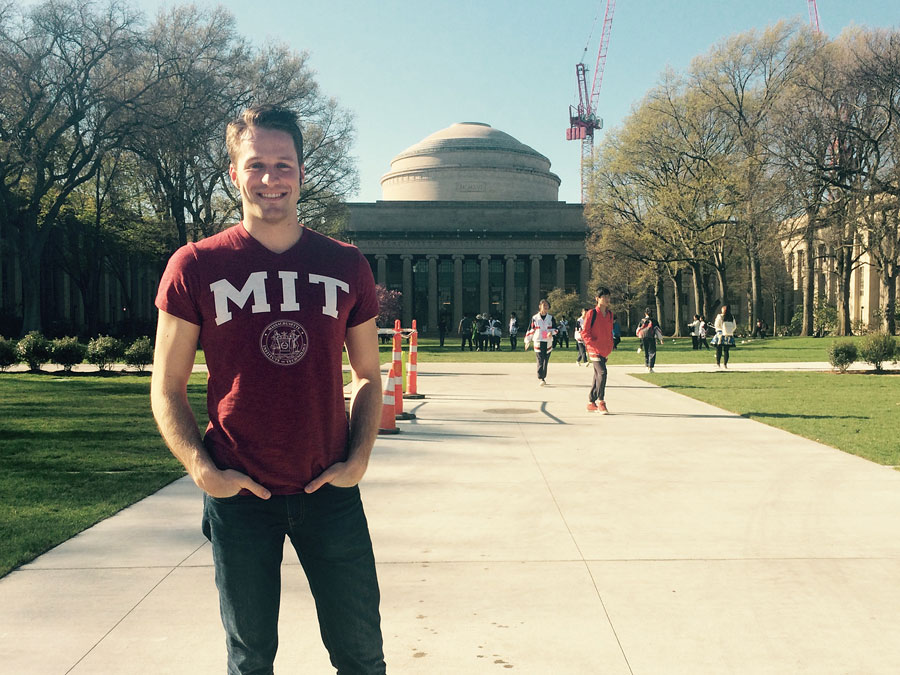Master's thesis in the United States:
"Going abroad always pays off"

TUMstudinews: How did you come up with the idea of writing your thesis in the US?
Glenk: I had always wanted to visit one of the American top-universities. The crucial aspects were that the tuition fees in the United States are much lower for a “Visiting Student Researcher” and that I could use my time there to work on my Master’s thesis.
What were your first steps to put your plan into practice?
At the beginning, I didn’t get much support here at TUM, as one couldn’t imagine it to work out. I was a bit disappointed initially. But there are always possibilities – even if the official ways appear to be difficult. You have to build up a bit of self-confidence for a project like that, and you shouldn’t be scared off too easily.
Did you organized it all on your own then?
Right! In the beginning, I did quite a lot of research how others managed to do it. Also, I thought third-party contacts might help me to get along. That didn’t work out, however, which is why I finally wrote directly to the professors in the US.
How did you go about it?
First, I tried to find a thesis subject and a professor at TUM. Then, I intensively searched for professors at universities in America who are familiar with my subject. All in all, I wrote to professors at five universities – Stanford, MIT, Harvard, Berkeley and UCLA – of which Stanford and MIT were my favorites from the very beginning.
Sounds like you invested a lot of time.
That’s true. The preparation took some time – and after I had written to the professors in January 2015, it wasn’t until June until I knew that it would work out. I had the original idea about a year before. Based on a recommendation by a TUM professor, it might have been easier – but that’s not always possible.
Why did you visit two universities?
I visited Stanford from September to December and MIT from January to May. I had gotten invitations from both universities. When I asked, my contact at MIT indicated that it might be possible to postpone the stay. When at Stanford, I realized how much I could learn – regarding the topic, but also personally – so I decided I wanted to organize the second stay as well. Also, it was a perfect preparation for my upcoming doctoral studies at TUM.
What support did you get from your supervisor in the US?
I got a cubicle in the PhD student office – and they said they’d be happy to answer questions. The professor at Stanford was interested in my subject, but he didn’t really have ambitions to conduct research in that area himself. After a few meetings, I was able to convince him. Today, I am still in close contact – and we still work together. In the US, student-supervisor relations are much closer than they are here. For example, you sometimes meet for some tennis or dinner.
What impressed you most on campus?
The range of offers is simply overwhelming. There are always lectures by leading personalities such as Steven Chu, winner of the Nobel Prize in Physics, or Elon Musk and Bill Gates. That was really exciting. In addition, the courses are much more intense. For example, a lecture on entrepreneurship with 40 hours per week was very time consuming, but I also learned very much.
Did you have a bit of free time in the US?
I did actually focus on working a lot – mostly from 7 am to 11 pm every day. Other students should not be put off by that though. Everyone has priorities, and I wanted to learn as much as possible during my fairly short stay. Especially California offers a lot of possibilities to spend your free time. Although my personal focus was on getting on with the subject of the thesis, I did a lot of sports – and I went on a small road trip along the coast of California.
Why are you so fond of studying abroad?
For me, there are three motivating aspects. First of all, broadening one’s horizon. New impressions help you to understand what surrounds you. Now, I am aware about what Germany is doing very well, and what not so much. For example, we are very critical, which probably helps us to keep up German quality standards. However, this does tend to result in negativity, which slows down innovation.
What else did you find motivating?
The second aspect is about getting to know new cultures – but also one’s own, because you constantly exchange views about that. Thirdly, you challenge yourself. In my opinion, the challenge is greater the further you are away from home. Thus, I would recommend everyone to go on as many longer stays abroad as possible. The effort is always worthwhile.
What are your plans for the future?
Now, I will be occupied with my doctoral studies for a while. In the longer run, I want to set up my own company – but until then, everything’s possible.
(Interview: Verena Pongratz)
Gunther Glenk, 25, is from Dinkelsbühl in Middle Franconia. Currently, he is a doctoral student with Prof. Gunther Friedl at the Chair of Management Accounting. In his third Master semester, Glenk spent a semester at Tsinghua University in Beijing with TUMexchange. He completed his Master’s studies of TUM-BWL. His Master’s thesis is about “Power of gas” as a form of energy storage.